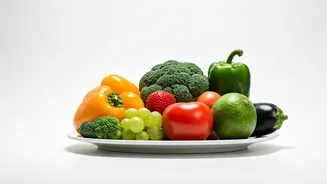Digestive Health's Best Friends
The journey to optimal digestive health, according to a gastroenterologist, can begin with a simple dietary shift. The expert emphasizes that many people
experience improved digestive function through the inclusion of specific fruits in their daily eating habits. This article highlights 10 fruits, detailing their beneficial properties, including high fiber content, enzymes, and other compounds that stimulate healthy gut function. Each fruit is presented individually, explaining how it works to ease digestion and promote regular bowel movements. The goal is to create a proactive approach toward digestive well-being, using natural, accessible resources. The focus is not only on what to consume, but also on how each fruit helps in maintaining a healthy digestive system, ensuring that readers are well-informed about how to take care of their digestive health through their food choices. This approach also includes practical advice on how to easily integrate the highlighted fruits into daily meals to yield the most significant benefits for overall well-being.
Apples for Digestive Ease
Apples stand out as an excellent source of both soluble and insoluble fiber, which are key for digestive health. Soluble fiber forms a gel that slows digestion, promoting better nutrient absorption and helping regulate blood sugar levels. Insoluble fiber, on the other hand, adds bulk to the stool, easing constipation and preventing other digestive issues. An AIIMS gastroenterologist often advises including apples in the diet due to their combined fiber content, which aids in promoting regular bowel movements and preventing problems like bloating and discomfort. Furthermore, apples contain beneficial compounds such as quercetin, an antioxidant that can protect against inflammation in the gut. The combination of fiber and antioxidants within apples makes them a valuable tool for a healthy digestive system. Consuming apples can improve gut health and overall well-being.
Bananas for Gut Health
Bananas are easily digested, making them a gentle choice for those with sensitive stomachs. Rich in potassium, bananas also support healthy gut function, contributing to the movement of food through the intestines. The fiber content in bananas aids in preventing constipation, providing bulk to the stool and supporting regular bowel movements. Furthermore, bananas contain prebiotics, which serve as food for beneficial gut bacteria. Prebiotics help in creating a balanced gut microbiome, which is essential for maintaining digestive health and overall immunity. For individuals experiencing digestive difficulties, bananas can be a simple, yet effective, way to ease discomfort and support overall gut function. They are easily accessible and can be included in any meal.
Kiwi: A Digestive Powerhouse
Kiwi fruits are often recognized for their enzyme, actinidin, which assists in protein digestion. This enzyme helps break down proteins, making the digestive process more efficient and reducing bloating. Kiwis are a good source of both soluble and insoluble fiber. These fibers assist in regulating bowel movements. The presence of fiber also supports the growth of beneficial bacteria in the gut, improving the overall digestive environment. Eating kiwi may lead to a reduction in digestive discomfort and an enhancement in the absorption of nutrients. The combination of fiber and actinidin makes kiwis a great choice for people looking to enhance their gut health and keep their digestion in good condition. They’re easy to eat and can contribute significantly to digestive well-being.
Papaya: Digestive Enzyme Magic
Papaya is rich in the enzyme papain, which assists in breaking down proteins. This supports the digestive process, which is great for people who have trouble digesting protein-rich meals. Papain eases bloating and discomfort, promoting smoother digestion. Papaya also contains fiber, which helps regularize bowel movements and prevents constipation. The fruit's fiber content contributes to a healthy gut microbiome, making it a valuable addition to a digestion-friendly diet. Incorporating papaya into meals can greatly aid in improving digestive comfort and function. The enzyme papain, in combination with its fiber, makes papaya a great fruit to consider for promoting better digestive health.
Pineapple's Digestive Benefits
Pineapple is known for its enzyme bromelain, which assists in breaking down proteins and aids in reducing inflammation in the gut. Bromelain enhances digestion, supporting the breakdown of food in the digestive system. This can decrease bloating, improve nutrient absorption, and provide relief from indigestion. Pineapples also have a good source of fiber, which is essential for regulating bowel movements. Regular consumption of pineapples may contribute to improved digestive function, as the bromelain and fiber work together to create a healthy digestive environment. These properties make pineapple a beneficial fruit for those with digestive problems. Its inclusion in the diet promotes enhanced gut health and a more comfortable digestive experience.
Pears for Fiber Intake
Pears are packed with fiber, contributing significantly to digestive health. The high fiber content provides bulk to stools, which promotes regular bowel movements and prevents constipation. Pears offer a good source of both soluble and insoluble fiber. Soluble fiber regulates blood sugar levels, while insoluble fiber helps in the movement of food through the intestines. Eating pears can boost digestive function, which also enhances overall gut health. For those looking to improve their digestive health, pears are a simple addition to any diet, helping in digestion and promoting a healthy digestive system. The easy access to pears makes it simple to incorporate them into everyday eating habits.
Berries for Antioxidants
Berries such as blueberries, strawberries, and raspberries are rich in antioxidants and fiber, both of which contribute to digestive health. The fiber in berries helps in promoting regular bowel movements and preventing constipation. Additionally, antioxidants found in berries protect the digestive tract from inflammation. The combination of fiber and antioxidants in berries creates a beneficial environment in the gut, improving digestion and enhancing overall gut health. Including berries in meals may enhance digestion and provide a dose of health benefits. These fruits offer a combination of properties to improve the digestive system. They are beneficial for those aiming to have better gut health.
Oranges for Digestion
Oranges are packed with vitamin C and fiber, making them beneficial for digestion. The fiber in oranges contributes to regular bowel movements, preventing constipation and ensuring smooth digestion. Vitamin C is an antioxidant that protects the gut lining and helps decrease inflammation. Eating oranges is a great way to support the digestive system and boost the overall health of the gut. Consuming oranges on a regular basis helps improve gut function. These readily available fruits can be a delicious and convenient way to boost digestive health. They also offer a boost to the immune system.
Avocados' Digestive Boost
Avocados are a good source of fiber and healthy fats, which support digestive health. The fiber in avocados assists in regulating bowel movements and prevents constipation. The healthy fats in avocados facilitate the absorption of nutrients, providing essential building blocks for a healthy body. Consuming avocados can greatly assist in enhancing digestive function and promote overall gut health. This versatile fruit is simple to include in a variety of meals, helping in improved digestion and nutrient absorption. Its properties make avocados an excellent food to include in your diet to ensure good health.













